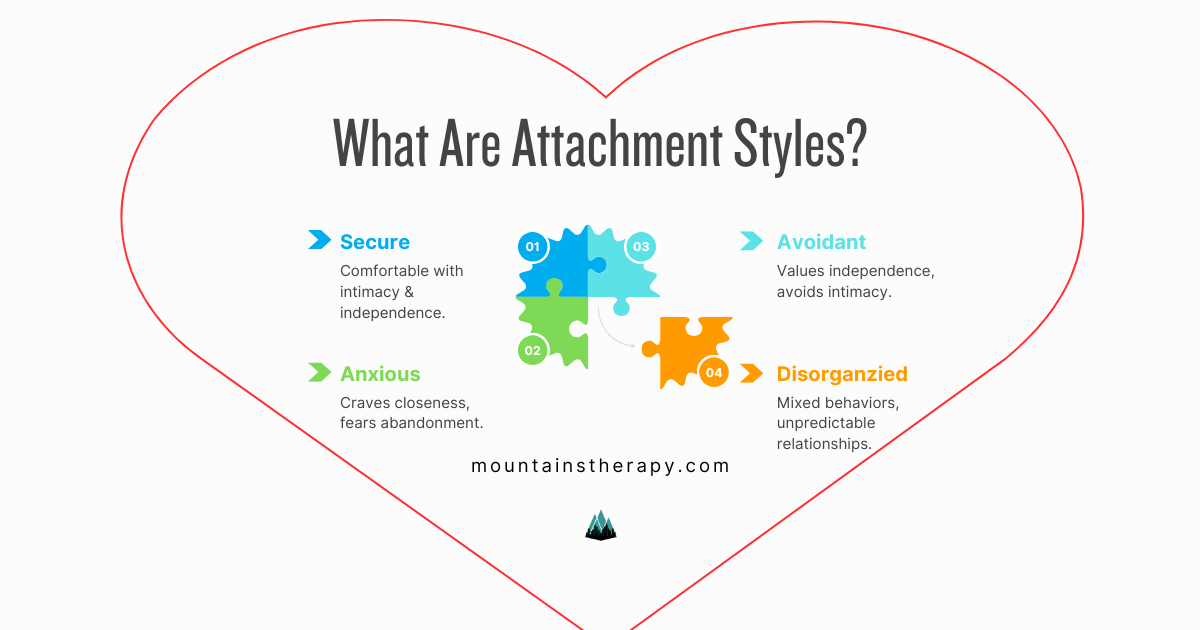What Are Attachment Styles? How Understanding Them Can Help Your Relationships
Learn more about Attachment Therapy.
In This Blog, You’ll Learn:
✅ What attachment styles are and how they develop
✅ The four primary attachment styles: Secure, Anxious, Avoidant, and Disorganized
✅ How understanding your attachment style can improve your relationships
✅ Self-assessment questions to identify your attachment style
✅ Common attachment issues and how they affect relationships
✅ How Mountains Therapy can support you in building healthier connections
What Are Attachment Styles?
At Mountains Therapy in Montclair, NJ, we know that understanding your attachment style can significantly impact your relationships. Attachment styles are patterns of behavior and thought that shape how we connect with others, particularly in intimate relationships. By learning about secure attachment, anxious attachment, avoidant attachment, and disorganized attachment, you can foster healthier, more fulfilling connections.
Common Attachment Issues and Their Impact on Relationships
Attachment issues often manifest as challenges in building and maintaining relationships. Individuals may struggle with trust, fear of intimacy, avoidance of closeness, or clinginess. These issues can contribute to conflict, miscommunication, and emotional distress within relationships. Addressing attachment issues through therapy can help individuals build healthier patterns and improve their overall relationship satisfaction.
Some common attachment-related issues include:
- Difficulty trusting others
- Fear of abandonment or rejection
- Struggles with emotional intimacy
- Overdependence on partners for validation
- Tendency to withdraw or shut down emotionally
- Difficulty maintaining long-term relationships
The Four Primary Attachment Styles
1. Secure Attachment:
People with a secure attachment style feel comfortable with intimacy and independence. They are generally trusting, open, and able to form healthy relationships.
Self-Assessment for Secure Attachment:
- Do you find it easy to connect with others emotionally?
- Are you able to trust your partner and feel secure in your relationships?
- Do you feel comfortable with both closeness and independence?
- Can you openly communicate your needs and feelings?
- Do you maintain a healthy balance of giving and receiving support in relationships?
2. Anxious Attachment:
Individuals with an anxious attachment style often crave closeness but fear abandonment. They may be overly dependent on their partners and require frequent reassurance.
Self-Assessment for Anxious Attachment:
- Do you often worry that your partner does not care as much as you do?
- Do you feel anxious when your partner is not around or does not respond quickly?
- Do you need frequent reassurance in your relationships?
- Do you struggle with jealousy or fear of being replaced?
- Are you overly sensitive to perceived signs of rejection or disinterest?
3. Avoidant Attachment:
Those with an avoidant attachment style may struggle with intimacy and prefer to maintain emotional distance. They value independence and may find it hard to rely on others.
Self-Assessment for Avoidant Attachment:
- Do you feel uncomfortable with too much closeness in relationships?
- Do you prioritize independence over emotional connection?
- Do you often find yourself pulling away when someone tries to get too close?
- Do you struggle to express your emotions openly?
- Do you feel uncomfortable when others rely on you emotionally?
4. Disorganized Attachment:
This style often results from inconsistent caregiving or trauma. It’s characterized by a mix of anxious and avoidant behaviors, leading to confusion and unpredictability in relationships.
Self-Assessment for Disorganized Attachment:
- Do you experience a push and pull dynamic in your relationships?
- Do you feel both a desire for closeness and a fear of it?
- Do your relationships often feel confusing or unpredictable?
- Do you switch between wanting intimacy and needing space?
- Are your relationships often characterized by chaos or instability?
How Understanding Attachment Styles Can Help Your Relationships
Improved Communication: When you understand your attachment style, you become more aware of your needs and fears in relationships. This awareness helps you communicate more effectively with your partner, reducing misunderstandings and conflicts.
Healthier Boundaries:
- Understanding your attachment style allows you to set healthier boundaries. Whether you need to work on opening up more or maintaining your independence, this insight helps you balance your needs with those of your partner.
Better Relationship Choices:
- Knowing your attachment style can guide you in choosing partners who complement your emotional needs. It also helps you recognize patterns that may not be serving you well, allowing you to make more conscious relationship choices.
Healing from Past Trauma:
- If your attachment style is influenced by past trauma, therapy can help you process these experiences and develop a more secure attachment style. Healing from past wounds enables you to form more stable and loving relationships.
How Mountains Therapy Can Help
At Mountains Therapy in Montclair, NJ, we offer specialized therapy to help you understand and work with your attachment style. Our experienced therapists use evidence-based approaches like Cognitive Behavioral Therapy, Dialectical Behavior Therapy, and trauma-focused therapies to support you in building healthier relationships.
Whether you are struggling with anxious attachment, navigating avoidant attachment tendencies, or looking to foster secure attachment in your relationships, we’re here to help you every step of the way. Get Started Today: Book a session with us to explore your attachment style and start your journey toward more fulfilling connections.














